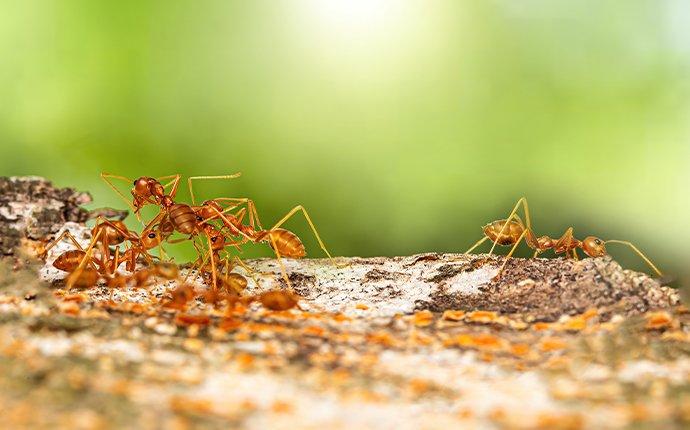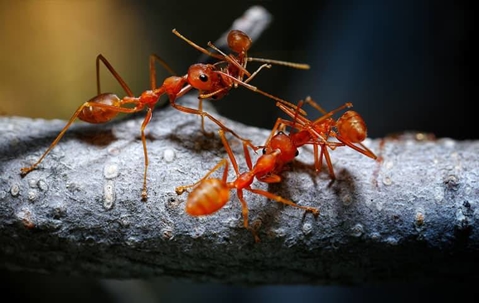Why Select Our Termite Control Services: Specialist Solutions for Effective Security
Why Select Our Termite Control Services: Specialist Solutions for Effective Security
Blog Article
Ecological Influence of Pest Control: Balancing Effectiveness With Sustainability
The ecological effect of bug control is a crucial issue that needs a fragile equilibrium between achieving effectiveness in making sure and handling insects sustainability of our communities. As we aim to safeguard our plants, homes, and wellness from the dangers presented by bugs, the methods we use can unintentionally hurt the atmosphere. From the use of unsafe chemicals that leak right into our soil and water to the unintentional effects on non-target varieties, the consequences of standard bug control techniques are far-ranging. There are arising strategies that use hope for a more sustainable technique to pest management. These solutions not just goal to attend to the instant insect issues but likewise take into consideration the long-term health of our planet.
Dangerous Chemicals in Insect Control
The application of hazardous chemicals in insect control positions substantial environmental and wellness risks that warrant cautious factor to consider and reduction techniques. Pesticides, herbicides, and pesticides are commonly made use of to eliminate pests, but their widespread application can result in unplanned repercussions. These chemicals can pollute dirt, water resources, and the air, influencing not only the targeted parasites yet likewise helpful bugs, wildlife, and people.

To deal with these dangers, integrated bug monitoring (IPM) techniques are being promoted as a much more sustainable alternative. IPM involves a combination of methods such as biological control, environment control, and the targeted use of pesticides as a last hotel (ant control stokesdale nc). By adopting an all natural strategy to pest control, we can minimize the environmental and health effects linked with hazardous chemicals while efficiently taking care of pest populations
Influence On Non-Target Variety
Taking into consideration the unplanned repercussions of bug control approaches, the effect on non-target types is a critical aspect that needs comprehensive evaluation. While pest control actions aim to target specific insects, various other microorganisms in the environment may be inadvertently impacted. Non-target varieties, consisting of useful insects, birds, mammals, and also plants, can suffer indirect or straight harm from chemical applications or organic control approaches.
Pesticides made to deal with a particular insect bug may harm pollinators like or all-natural predators such as ladybugs. Organic control agents, if not species-specific, can posture threats to unexpected targets, disrupting the ecological balance.
To reduce the influence on non-target varieties, integrated pest administration (IPM) strategies that highlight a holistic method to pest control are recommended. These approaches focus on making use of environmentally friendly techniques, reducing injury to helpful organisms while successfully handling pest populations. Conducting complete danger analyses and keeping track of the outcomes of insect control efforts are important action in protecting non-target species and advertising general environment health and wellness.
Soil and Water Contamination
Unexpected environmental repercussions of pest control techniques extend past affecting non-target species, with considerable effects for soil and water contamination. Pesticides, herbicides, and chemical plant foods used in insect control can leach into the dirt and pollute groundwater, posturing a threat to both aquatic and earthbound communities. Soil contamination can interrupt the balance of bacteria crucial for nutrition cycling and plant growth, causing decreased soil fertility and performance. Moreover, these chemicals can continue in the setting for extended periods, building up in the dirt and possibly going into the food chain.
Water contamination is an additional critical issue related to parasite control practices. Runoff from farming areas treated with pesticides can lug these chemicals right into neighboring water bodies, influencing water microorganisms and water quality. Contaminants in water sources can have far-reaching effects, influencing not just aquatic life yet also human wellness through the intake of infected water or marine microorganisms. To minimize dirt and water contamination from insect control tasks, integrated insect management strategies that prioritize sustainability and decrease chemical inputs are vital.
Air Pollution From Pesticide Use
Direct exposure to air-borne chemicals throughout farming applications postures a considerable concern for air contamination control actions. They can volatilize into the air and type unstable natural substances (VOCs) and various other air-borne contaminants when pesticides are sprayed onto plants - termite control services. These chemicals can add to the development of ground-level ozone, a major component of smog that can have harmful results on human health, plant efficiency, and general air quality. Additionally, pesticide drift, where pesticides are lugged look at this site by the wind to unplanned locations, can cause the contamination of nearby communities and water bodies.

Approaches for Lasting Bug Control
In the realm of agricultural techniques, carrying out sustainable parasite control methods is vital for keeping environmental balance and protecting plant returns. Sustainable parasite control emphasizes making use of eco-friendly techniques to manage parasite populations properly while reducing damage to non-target microorganisms and communities. Integrated Pest Administration (IPM) is a widely adopted approach that combines biological, social, physical, and chemical control techniques to achieve long-lasting parasite administration services.
One key approach in sustainable parasite control is promoting biodiversity within agroecosystems. By boosting natural adversaries of insects, such as parasitoids and killers, farmers can lower the requirement for artificial chemicals. Plant turning and diversity are likewise efficient methods to disrupt pest life process and produce less positive problems for insects to prosper. Furthermore, making use of pest-resistant plant selections and using techniques like trap chopping can help in reducing insect stress without depending greatly on chemical interventions. Ultimately, by incorporating these lasting pest control methods, farmers can accomplish an equilibrium in between pest monitoring effectiveness and environmental stewardship.
Final Thought
Finally, the environmental impact of insect control techniques must be very carefully taken into consideration to balance performance with sustainability. Dangerous chemicals used in parasite control can lead to soil and water contamination, air pollution, and damage non-target types - ant control. It is vital to implement lasting bug control techniques to lessen these negative results on the atmosphere and promote a healthier community for future generations
By embracing a holistic method to pest control, we can lessen the ecological and wellness influences associated with harmful chemicals while successfully handling pest populaces.

To reduce the air pollution caused by chemical use, it is essential to adopt integrated insect management strategies that prioritize the usage of non-chemical bug control techniques, such as crop rotation, natural predators, and resistant plant selections. Sustainable insect control emphasizes the usage of ecologically friendly techniques to manage parasite populations properly while reducing harm to non-target organisms and environments. Integrated Pest Management (IPM) is a commonly taken on technique that combines biological, social, physical, and chemical control techniques to achieve long-lasting bug monitoring solutions.
Report this page